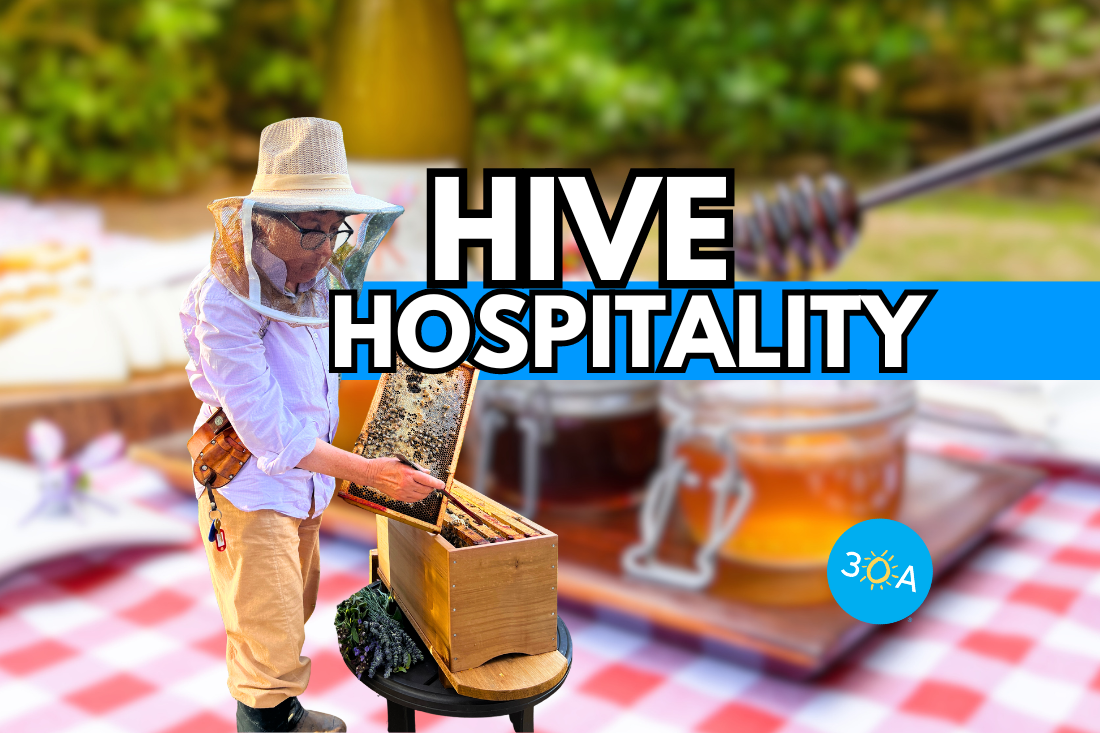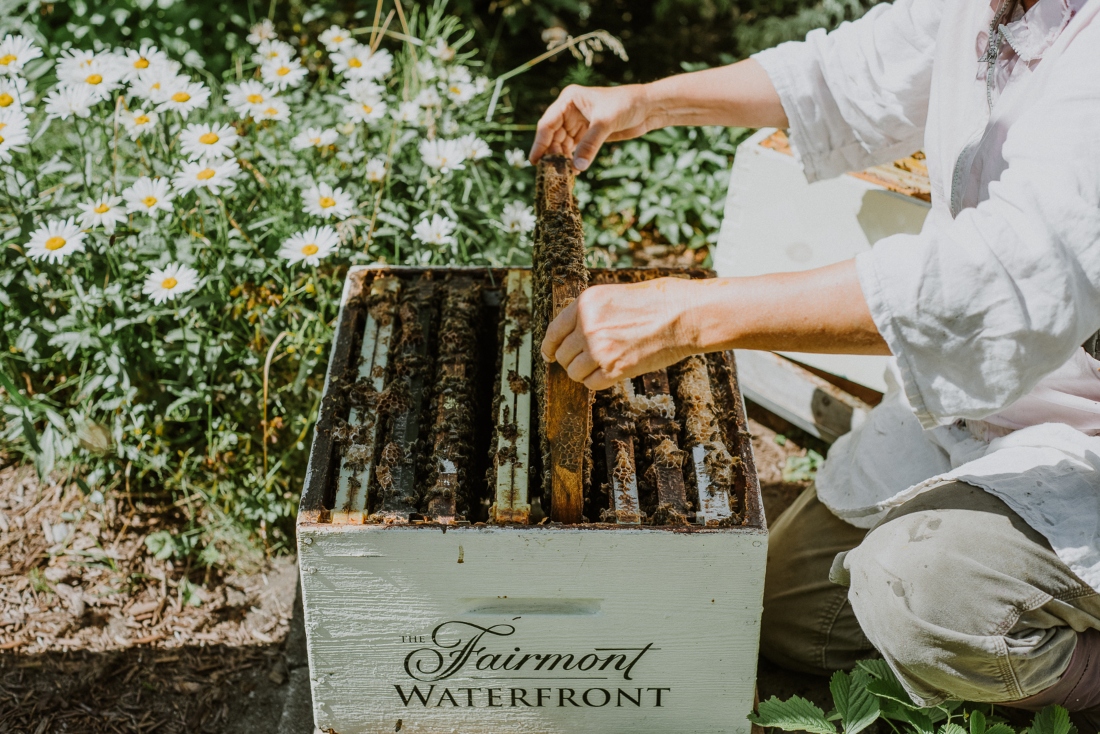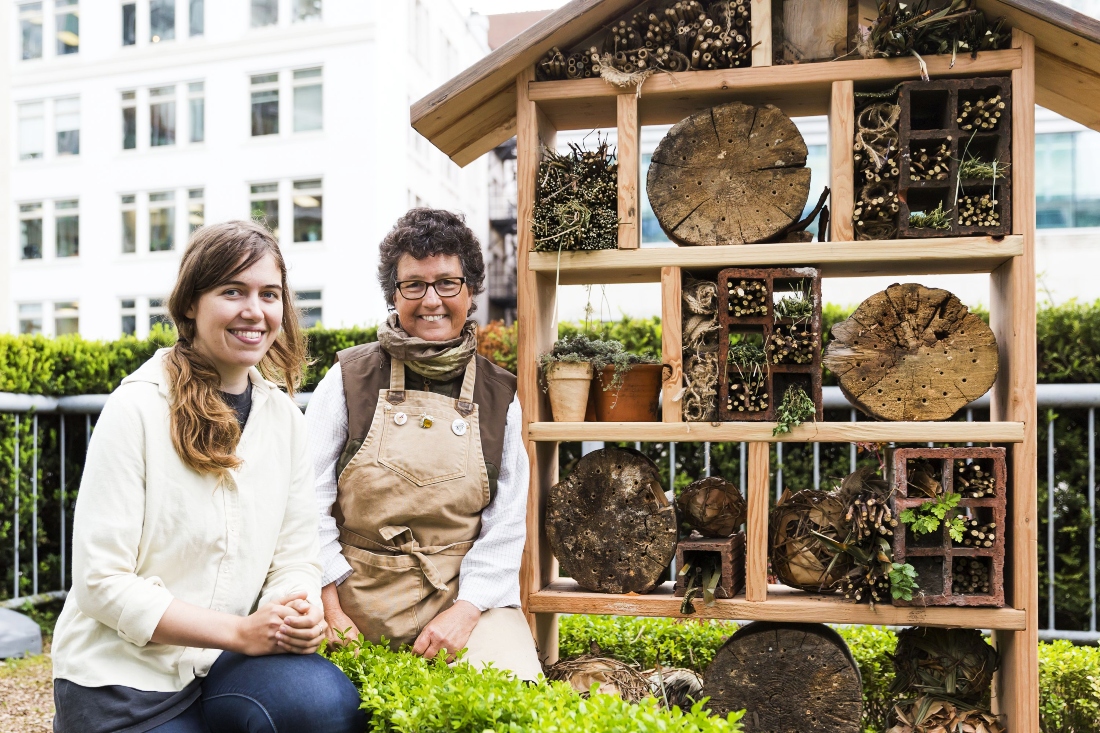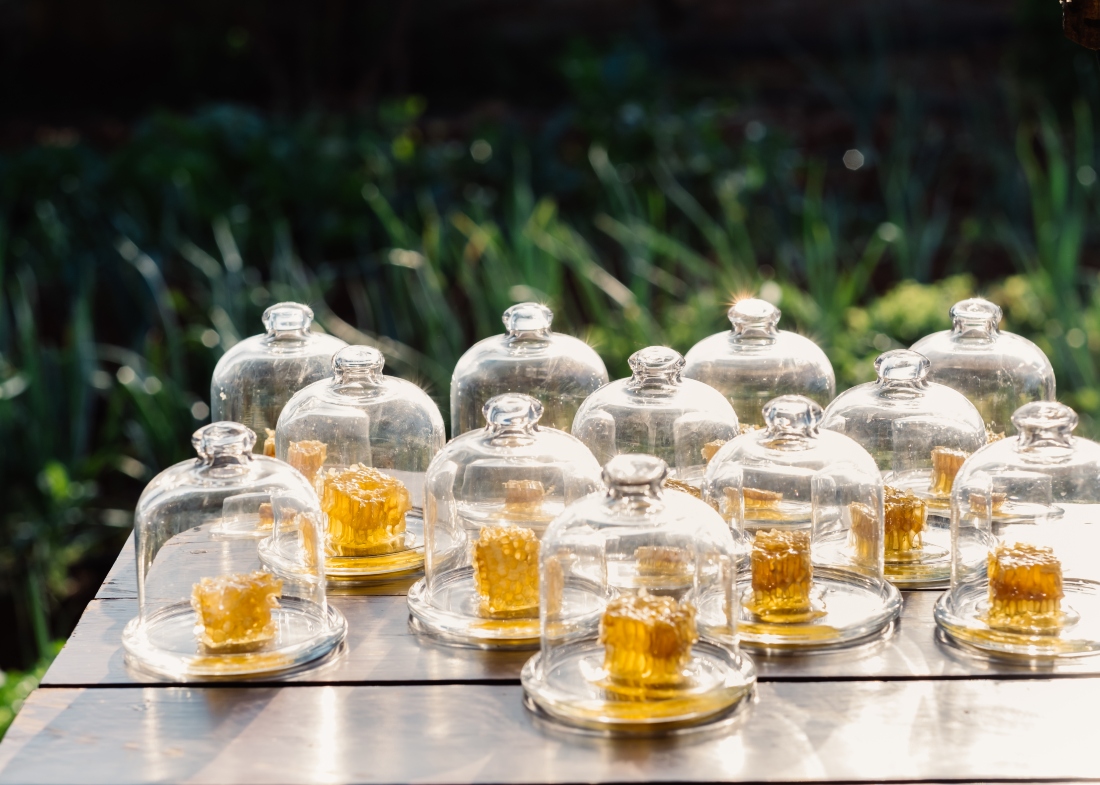


Ornate elevator doors open on the third floor of the Fairmont Waterfront Hotel in Vancouver, British Columbia, to breathtaking views of the harbor with the North Shore Mountains rising in the distance. I’m here to experience their “Bee & Bee” sustainability initiative, a built-in partnership with the Hives For Humanity Pollinator Corridor Project.
The pollinator hotel situated on the rooftop comes from local materials—the Haida nation donated wood for the structure; fire bricks came from Downtown Eastside (Vancouver’s oldest neighborhood); urban gardens across the city provided bamboo, sticks, and plants; and volunteers wove the bumblebee nests with scavenged ivy, wool, and leaves. The rooftop garden, already a summer home for thousands of honeybees, is tended by the hotel’s beekeeper, Julia Common. The third-floor terrace also serves as a habitat for hundreds of species of solitary bees (super pollinators) native to British Columbia.
Walking past the 50-foot rooftop pool, I enter a fairyland garden with impossibly tall Dr. Seuss-looking flowers reaching for the sky. Clumps of rosemary, a flood of mint, and apple trees of all varieties populate the path. Julia offers me a veil for our journey into the pollinator paradise. Dressed in a blue and red (bees’ favorite colors) striped shirt, khakis, a leather belt with her hive tool hanging, and a veil, she leads me around the potager (kitchen) garden, pointing out the different species of bees.


Julia and her daughter started Hives for Humanity, a local non-profit that “creates opportunities for connection to community, through nature, bees, and the culture of the hive…on the unceded lands of the Musqueam, Tsleil-Waututh, and Squamish Nations of the Coast Salish peoples,” in 2012.
The Fairmont Hotel was the first company to support their work.
Pausing by the sprouting kale, she brings me closer to the mason bees’ house. They are native to Vancouver, don’t sting, and pollinate the early blooms. As she delicately pulls a shelf out of the house, she relays how as a young student, she went to a bee research lab in Manitoba, and the professor gave her two hives. From the moment she first stuck her hand in the hive, she was hooked—another world that requires total concentration and deliberate movement opened up to her.
Signs interrupt shoots of Thai basil, woodland sage, and blue salvia along the path with information about wild bees, the pollination of plants, and the importance of bringing back bee habitats. The buzzing symphony provides the soundtrack as they flit from plant to plant.
When we reach the recently harvested cherry tomatoes and basil plot, Julia sets up a table with some collected lavender and sage next to one of the larger bee hotels. She lights the herbs and then loads a small bellow with the smoke that she dispels into the panels filled with 1,000 bees. Lavender-sage smoke fills the air as she reaches in bare-handed and pulls out one of the shelves for closer inspection.
She passes me the shelf. I’ve never been this close to a working hive. The shelf feels weighty beyond its 10 pounds. In my hands, 100 bees crawl around the intricate honeycomb already built, filling in more, revealing a microcosm of life. Delicate honey streams pool in the pockets. I steal a taste of the warm liquid gold studded with bits of beeswax as Julia retrieves a piece of bee bread—a mixture of pollen and nectar that serves as the main food source for honey bee workers and larvae—for me to sample. The savory, kombucha-like fermented flavor stands in stark contrast to the sweet honey.
Meandering our way back towards the elevator, Julia leaves me with a final thought. “As cities like Vancouver develop, bees lose their habitats. To save them, plant a pollinator garden; don’t become a beekeeper.” The pandemic inspired so many urban beekeepers to build their own bee hotels on terraces and patios, but the pace of gardens has not kept up, and bees starve when pollen is scarce. The Pollinator Corridor Project seeks to remedy that in Vancouver by converting urban spaces like barren rooftops into pollen-filled meadows and gardens.
Bee suit retired, I settle into dinner at Arc Restaurant and Bar. The bounty from the potager garden figures prominently in the pollinator dinner. Nishant comes over to the table with a tray full of implements. He smokes a rosemary sprig from the garden and then builds a Flaming Rosemary Gimlet, the tastiest version of the drink I’ve ever tried.
Wayward Distillers on Vancouver Island and the Fairmont Waterfront partnered to produce a gin distilled from the rooftop honey. Most distillers use honey as a flavoring agent, but Wayward includes it as a base in the distilling process and produces this custom gin exclusively for the hotel.
Hives for Humanity candles drip their golden beeswax as the first course arrives: a delicate zucchini blossom stuffed with mozzarella and drizzled with Fairmont honey. Each course features various ingredients from the 2100-square-foot garden, like ramp pesto for the Foglie d’ulivo (pasta), black garlic honey glaze for the lamb, and spruce honey drizzled on the olive oil cake and berries dessert. As a final touch, the meal includes a donation to Hives for Humanity, and a jar of honey made onsite to take home—a sweet memento from an incredible experience.
And the Fairmont Waterfront isn’t stopping with guests, they are pollinating the future with their kid’chen program.
Solitary pollinator bees make up 90 percent of the global bee population and are responsible for the pollination of one-third of the food we eat. To help the next generation see and understand their importance, the Fairmont invites local 6th and 7th graders to come and tour the garden and apiary, help harvest honey, learn kitchen skills, and return the next evening to assist the hotel team with a gala-style dinner. The event raises funds to support extra-curricular activities for the students while the students gain valuable life skills and respect for the humble honey bee.
Grand Velas Riviera Maya, Mexico
A new bee sanctuary, the Meliponario, debuted in 2023 to help preserve ancient bee species and to facilitate their honey production. Every Wednesday at 10:00 a.m. an eco-tour starts with a visit to the hotel’s organic orchard to learn about the pollination process and the importance of the Melipona bees. Chef Nahum Velasco leads guests through a honey tasting with samples from different parts of the country. Guests leave with a take-home bee alebrije (wood carving) and the whole experience is included with the stay.
For more information, visit rivieramaya.grandvelas.com.
Alila Ventana, California
Alila Ventana Big Sur’s organic garden—a space that evinces their ethos of respecting the earth and its bounty—includes an apiary filled with honeybees. Every Sunday, Tuesday, and Friday at 1:00 p.m., guests can take part in “Bees and Big Sur,” where they learn about the importance of bees and pollination to our world. The experience is followed by a blind tasting of honey sourced from the property and around the world. Beyond the bee program, Alila Ventana irrigates with rainwater, constructs more than half its furniture from reclaimed wood from the property and surrounding area, and has an extensive property-wide recycling program. Sustainability is not just about their activities; it lives in their design.
For more information, visit ventanabigsur.com.
Mauna Kea Beach Resort, Hawaii
Mauna Kea Resort now harvests honey from on-property apiaries. Understanding the significant impact bees have on the local environment and indigenous plants, the resort established a population of honeybees to aid in pollination for local farming, flowers, and native plant production. The fresh honey gathered appears on food and beverage menus at restaurants in The Westin Hapuna Beach Resort and Mauna Kea Beach Hotel. This initiative extends their commitment to tourism that does no harm to local communities. Guests can also make leis, learn basic hula, take Hawaiian language classes, and more to connect more deeply with Hawai’i’s vibrant culture and history.
For more information, visit maunakearesort.com.
Blue Palace, Greece

The Phāea Plan Bee sustainability initiative aims to raise awareness about the importance of bees to the environment by creating and maintaining apiaries and bee-friendly hotels. Blue Palace’s bee-friendly landscape is filled with pollinator gardens and abundant water sources. Guests can visit the bees in their homes, and on two dates this season—July 7 and August 11—they can help harvest some honey and enjoy a honey tasting with Cretan pies sprinkled with freshly harvested honey and a honey-inspired cocktail.
For more information, visit bluepalaceresort.gr.




